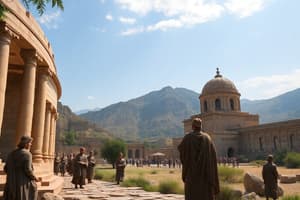Podcast
Questions and Answers
What is the primary focus of the study of history?
What is the primary focus of the study of history?
- The analysis of economic data
- Focus on geographical changes over time
- Future predictions based on current events
- The study of past events in human affairs (correct)
Which period came after Ancient History?
Which period came after Ancient History?
- Prehistory
- Medieval History (correct)
- Modern History
- Early Modern Period
What does 'chronology' refer to in historical studies?
What does 'chronology' refer to in historical studies?
- The study of ancient scripts
- Exploration of primary and secondary sources
- The arrangement of events by their occurrence (correct)
- An analysis of historical narratives
Which of the following figures is known for creating a large empire?
Which of the following figures is known for creating a large empire?
What was a significant event in Medieval History?
What was a significant event in Medieval History?
How does historiography differ from other historical concepts?
How does historiography differ from other historical concepts?
Which development is associated with the Early Modern Period?
Which development is associated with the Early Modern Period?
What does the term 'primary sources' refer to?
What does the term 'primary sources' refer to?
Flashcards are hidden until you start studying
Study Notes
Overview of History
- History is the study of past events, particularly in human affairs.
- It provides insights into societal changes, cultural developments, and influential figures.
Importance of History
- Understanding the past helps explain present circumstances and inform future actions.
- It aids in recognizing patterns and lessons in human behavior.
Key Historical Periods
-
Prehistory
- Time before written records; includes the Stone Age, Bronze Age, and Iron Age.
- Development of early human societies and cultures.
-
Ancient History (c. 3000 BCE - 500 CE)
- Civilizations: Mesopotamia, Egypt, Indus Valley, China, Greece, Rome.
- Key events: Development of writing, the wheel, and early governments.
-
Medieval History (500 - 1500)
- Feudalism in Europe, the rise and fall of empires (e.g., Byzantine, Islamic Golden Age).
- Significant events: The Crusades, the Black Death.
-
Early Modern Period (1500 - 1800)
- Renaissance and Reformation; exploration and colonization.
- Key developments: Scientific Revolution, Enlightenment ideas.
-
Modern History (1800 - present)
- Industrial Revolution; World Wars; Cold War.
- Notable movements: Civil rights, decolonization, globalization.
Key Concepts in History
- Chronology: The arrangement of events in the order of their occurrence.
- Historiography: The study of historical writing and perspectives.
- Primary Sources: Original documents or evidence from the time period being studied.
- Secondary Sources: Interpretations or analyses based on primary sources.
Historical Methodology
- Research: Gathering data from various sources.
- Analysis: Interpreting historical events and understanding their significance.
- Presentation: Communicating findings through writing or other media.
Significant Historical Figures
- Alexander the Great: Military leader who created one of the largest empires.
- Julius Caesar: Roman general and statesman who played a critical role in the rise of the Roman Empire.
- Cleopatra: Last active ruler of the Ptolemaic Kingdom of Egypt.
- Nelson Mandela: Anti-apartheid revolutionary and South Africa's first black president.
Understanding History
- History is subjective; different interpretations can exist for the same events.
- Culture, religion, and ideology greatly influence historical narratives.
- History shapes national identities and collective memories.
Overview of History
- History explores the past, particularly human activities, providing insights into societal changes, cultural advancements, and influential figures.
Importance of History
- Understanding the past helps explain the present and inform future decisions.
- It allows for recognizing patterns and lessons within human behavior.
Key Historical Periods
- Prehistory: Period before written records, encompasses the Stone Age, Bronze Age, and Iron Age, marked by the development of early human societies and cultures.
- Ancient History (c. 3000 BCE - 500 CE): Includes civilizations like Mesopotamia, Egypt, Indus Valley, China, Greece, and Rome. Key events include the development of writing, the wheel, and early governments.
- Medieval History (500 - 1500): Characterized by feudalism in Europe, the rise and fall of empires (Byzantine, Islamic Golden Age), and significant events like the Crusades and the Black Death.
- Early Modern Period (1500 - 1800): Marked by the Renaissance and Reformation, exploration and colonization, Scientific Revolution, and Enlightenment ideas.
- Modern History (1800 - present): Includes the Industrial Revolution, World Wars, Cold War, and significant movements like civil rights, decolonization, and globalization.
Key Concepts in History
- Chronology: Arranging events in order of their occurrence.
- Historiography: The study of historical writing and perspectives.
- Primary Sources: Original documents or evidence from the time period being studied.
- Secondary Sources: Interpretations or analyses based on primary sources.
Historical Methodology
- Research: Gathering data from various sources.
- Analysis: Interpreting historical events and their significance.
- Presentation: Communicating findings through writing or other media.
Significant Historical Figures
- Alexander the Great: Military leader who created one of the largest empires.
- Julius Caesar: Roman general and statesman instrumental in the rise of the Roman Empire.
- Cleopatra: Last active ruler of the Ptolemaic Kingdom of Egypt.
- Nelson Mandela: Anti-apartheid revolutionary and South Africa's first black president.
Understanding History
- History is subjective, allowing for different interpretations of the same events.
- Culture, religion, and ideology significantly influence historical narratives.
- History shapes national identities and collective memories.
Studying That Suits You
Use AI to generate personalized quizzes and flashcards to suit your learning preferences.




